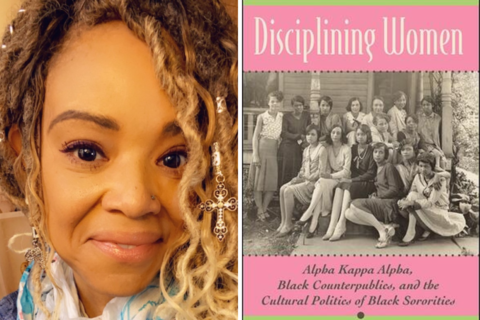By Alice Eberhart
Deborah Whaley’s book, Disciplining Women: Alpha Kappa Alpha, Black Counterpublics, and the Cultural Politics of Black Sororities, has gained new relevancy with the nomination of Vice President Kamala Harris as the Democratic presidential nominee for 2024.
Whaley’s book, which was published in 2010, focuses on Black sororities, namely Alpha Kappa Alpha (AKA), and the unique ways that they interact with politics, culture, and society. Whaley is a professor in the Department of English in the College of Liberal Arts and Sciences.

Harris, a member of AKA, spoke at an AKA Boule a week before President Joe Biden dropped out of the presidential race. This led to the New York Times publishing an article on her book and the Harris campaign. Whaley was also recently interviewed on Iowa Public Radio’s River to River program and in Slate.
“Despite the book being from years ago, many of the topics are still relevant,” Whaley said. “Black Greek letter organizations are still an enigma to the wider culture—the idea that they are just social organizations and that they are elitist and not influential remains. To the contrary, they are uniquely responding to historical and current marginalization and mobilizing for political action.”
Whaley noted how Harris speaking at a recent sorority event was misunderstood by many, who thought she was simply attending a sorority party. “To the contrary, when VP Harris gave an address at the Boule of AKA a week and a half before Biden announced stepping down it may have sounded like a campaign speech,” Whaley said. “She was emphasizing the work of the Biden administration and how that work dovetails with the community organizing and political work of historically Black sororities. Many of the social justice efforts of Black sororities and fraternities end up overlooked.”
AKA, and many other Black sororities, have had a hand in political mobilization since their inception, Whaley said. AKA, for example, set up rural health clinics for underserviced populations in the 1930s. They also mobilized to increase voter registration, were active in civil rights and desegregation efforts, anti-lynching legislation, the suffrage movement, and anti-apartheid demonstrations in South Africa, all while upholding educational excellence. In 2005, they donated to help those affected by Hurricane Katrina and helped to rebuild the community by building houses. As soon as Harris announced she would run for president, all Black Greek Letter Organizations pledged to conduct an aggressive, national voter registration drive.
“Sororities are civic organizations,” Whaley said. “They are a combination of the social and political, the social and cultural. They articulate these various modes together to make an impact.”
Disciplining Women also covers the unique issues that women of color face in the public sphere, including Harris, Whaley said.
“Outside of a political stance, Harris is being assessed by metrics that many women and women of color in the public sphere are familiar with,” Whaley said. “There is a fine line women have to walk when they present themselves. Women in sororities know this well as they balance assertive leadership and the demands of femininity.”
Whaley has done interviews with Slate, French Elle, and The New Yorker about how Black sorority activism is realized throughout the career of Harris and in her current political platform, which is to assess and meet the needs of those most vulnerable in society.
Whaley’s current book project examines dissociative identities as a narrative device in novels, science literature, popular periodicals, film, television, music, and memoir, with a particular focus on Latinx, White, Asian/American, and Black women. It is tentatively titled Feeling Her Fragmented Mind: Women, Race, and Dissociative Identities in Popular Literature and Culture.